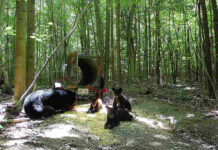SALEM, Ohio – There were no hanging chad controversies, but political pundits will be talking about this year’s election well into the new year.
Voters shifted gears last Tuesday, giving Democrats control of the U.S. Senate and a majority in both sides of Congress. Nationwide, the Democrats gained six governors and now claim the majority in governors’ mansions across the country, 28 to 22.
Out with the old. Pennsylvania voters elected current state treasurer Bob Casey as their new U.S. senator, ousting Rick Santorum, a Republican member of the Senate Agriculture committee. Four Republicans in the state’s 19-member Congressional delegation also lost their election bids.
Control of the Pa. House is unknown, awaiting the count of several hundred absentee ballots in two races in the Philadelphia area that could swing the balance from current Republican hands to the Democrats.
Ohio voters also gave the nod to several Democrats, including the new governor, U.S. Rep. Ted Strickland; a new U.S. senator, former U.S. Rep. Sherrod Brown; and several U.S. representatives. A race between incumbent U.S. Rep. Deborah Pryce and her Democratic opponent Mary Jo Kilroy is still up in the air, with 18,000 absentee and provisional ballots yet to be counted.
The Republicans held their majority in the Ohio General Assembly.
Not surprised. The tide change came as no shock to most observers.
“We really weren’t surprised by very much that happened,” said Gary Swan, government affairs and communications division director for the Pennsylvania Farm Bureau.
The Pennsylvania House had roughly 50 open seats, the aftermath of the infamous 2005 pay raise “clean house” sentiment. Swan estimates Farm Bureau staff and local volunteers met with 80 candidates over the summer.
Even so, he called the election outcome a “turbulent political change.” Losing legislators like longtime ag supporter U.S. Rep. Don Sherwood, who helped craft the Milk Income Loss Contract program, and Sen. Rick Santorum, who served on the Senate Agriculture committee, creates “a little bit of a question” about future ag backers, Swan said.
Learning curve. The Democratic sweep, Ohio’s term limits and Pennsylvania pay-raise ousters will bring a lot of new faces to the statehouses. In fact, 40 of Ohio’s 99 representatives are new to their offices.
“That’s a lot of people,” said Keith Stimpert, vice president of government affairs for the Ohio Farm Bureau Federation.
“We’ve got to take the steps just to learn their names.”
While new legislators bring new ideas, they don’t have the “corporate memory” of past legislation, agencies or programs, added Gwen Wolford, director of government relations for OSU Extension and the Ohio Agricultural Research and Development Center.
“They have a learning curve,” Wolford said, adding the earlier you can connect with a new legislator, the better.
But if you go calling, be prepared to take a number. Everyone has the same idea. Swan said Farm Bureau staff and volunteers hope to sit down “with as many as possible as quickly as possible.”
“The one common thing among all new officeholders is a natural mindset to reach out and begin to develop relationships,” Swan said.
“There’s no better time than right now.”
Now what? Although “cooperation” seems to be the post-election battlecry, new leaders will undoubtedly mean a new Congressional agenda.
Wolford looks for sustainable small farms and trade issues to move to the front burner of ag debates. And environmental issues are going to be big, too.
The change in Washington could hasten a comprehensive immigration reform program, Swan said, one that includes guestworker options and a foolproof worker identification program.
Pennsylvania avoided the “disastrous labor shortages” that hit farms in New York and California this year, but the issue can’t be ignored at the federal level any longer, he added.
The 2007 farm bill will command attention with the start of the new Congressional year, but with Minnesota Democrat Collin Peterson the likely chair of the House Agriculture Committee, there could be more push for an extension until trade issues are rehashed.
And a Democratic-dominated Congress could weigh against the expansion of foreign trade.
Get energized. On the state level, the Ohio farm lobby knows a Strickland administration will be interested in jobs and the economy, youth and families from an education perspective, and alternative energy.
The first proving ground will be the biennial budget process. Gov.-elect Strickland will have until March to release his proposed budget and legislators will be forced to get up to speed with the process and the recipients of the state’s dollars.
But if there’s one common ground for new and old legislators on both the federal and state level, and for the farm and nonfarm lobby, it’s energy.
“The most promising area is energy, including renewables,” said Ohio Farm Bureau’s Stimpert.
“Renewables are just right now hitting full stride.”
Can they deliver? Is this split political scene setting the stage for a big showdown in the 2008 presidential election? Even the Democrats admit they’ve got to deliver on their “change” mandate or voters will speak out again.
Or, as OSU’s Wolford puts it: “A lot can happen in the next two years.”
On the radar. Several initiatives that affect agriculture were hidden among the sweeping political changes. And Pa. Farm Bureau’s Swan is as concerned about them as any legislator shift.
He pointed to an initiative passed in Arizona that prohibits the use of farrowing crates for pregnant sows and veal crates for calves. The measure will go into effect Dec. 31, 2012.
Even though hog and veal production is very small in Arizona, the precedent is what concerns the farm lobby. Swan expects more intense activism to push similar measures elsewhere.
“There are misguided regulation and laws that are going to have a detrimental effect on agriculture.”
(Farm and Dairy Editor Susan Crowell can be reached at 800-837-3419 or at editor@farmanddairy.com.)
Get 4 Weeks of Farm and Dairy Home Delivered









